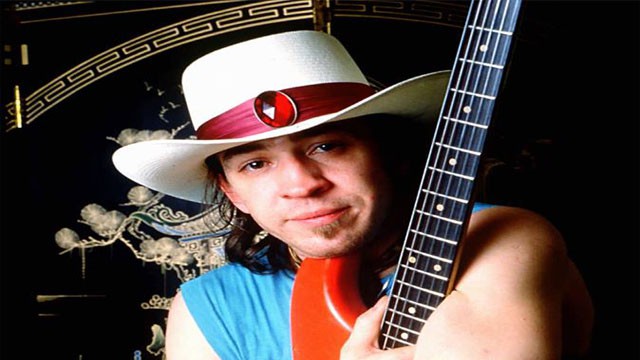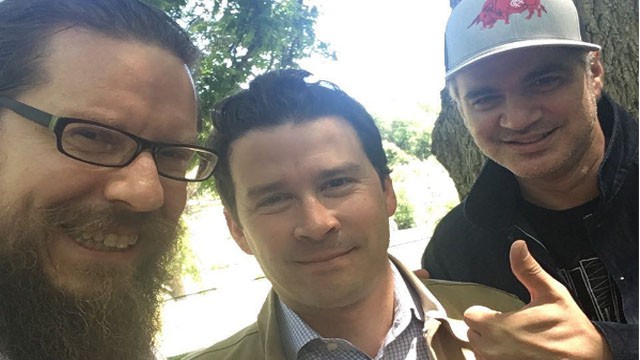Business Spotlight: Collings Guitars
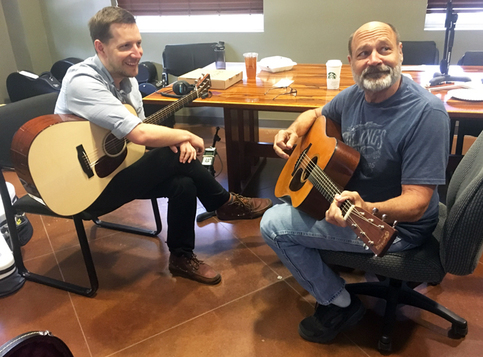
Within a few minutes of meeting the passionate polymath Bill Collings, you quickly come to understand why the best of the best guitar luthiers around the world know him as "the Steve Jobs of guitar makers." (Though a comparison to Antonio Stradivari might be more appropriate.) Collings is wicked smart, obsessive about tiny details that will blow past most people, well read, and he possesses a razor sharp sense - a gut instinct - on what works of design and engineering are "insanely great," and what is not. He's spent the last 42 years setting the benchmark for superior guitar making in an industry built upon obsession over minutia. Collings is a maker of things first and foremost, with an artist's dedication to finding the perfect sound from the manipulation of wood...and an almost spiritual devotion to crafting exquisite sounding machines that will outlive us all.
In the week that we interviewed Collings, Punch Brothers guitarist Chris Eldridgehad flown across the United States just to sit down, listen to, and compare guitar tones with Collings. A few days prior to that, Boyz II Men singer Shawn Stockmanwas attempting to move heaven and earth to arrange a visit to Collings Guitars in his couple of hours of free time outside of his headlining gig at Austin's Frank Erwin Center arena. Pete Townsend, Keith Richards, Joni Mitchell, Eddie Van Halen, Lyle Lovett, Paul Simon, Brian May, and countless others...in search of immortality through guitar tone, they all have come to Collings to purchase instruments. "I can’t tell you how many people came through (Eddie Van Halen)," Collings explained to Texas Monthly a few years ago. "It was a word-of-mouth thing."
TMO Marketing Coordinator Marc Fort made the pilgrimage to Collings manufacturing warehouse in Dripping Springs in order to sit down with the master craftsman to discuss how it all started, the ins and outs of the guitar making business, and how the one man operation has grown to 90-plus employees, all attempting to fulfill the worldwide demand for "the Collings' tone."
This is Part 1 of a 2 part interview. Part 2 will be featured in the July 2017 TMO Newsletter.
TMO: You started Collings Guitars circa 1975. What were you doing before that?
Collings: “Well, I went to college. Out of college in 1972. Went to Ohio University. Never graduated. Just forgot it…because the last school I went to, the tanks came and they gassed us, just like they did at Kent State. But I had a job pre-1972 with a machinist. It was 1971 and I was like 21, or something like that. And I learned more from that guy than I did from anything else…in 3 or 4 years with him."
TMO: Were you studying engineering at school?
Collings: "I did a little. I started out pre-med, and then got lost with the war. Everybody on edge. The whole thing just…I wasn’t into it (school). I was just...confused. If I look at it today...it was a tough time. A real tough time.
"And so I followed my own interests! And they always kept me busy. They didn’t keep me doing anything wrong…they just kept me busy.
"And in 1971 or 1972 or so, even when I was younger…I was making parts for banjos and things like that. And I was buying shell, cutting shell up. And my friend said, 'There’s a place in Ohio, Stuart McDonald’s, that sells that stuff already processed.' I went, 'Really!?' See, I didn’t know any of this stuff. And it (the pre-processed wood and shell) made it a little easier to get going on stuff (I was building). I made necks. I made a banjo in that earlier period, and some other stuff…"
TMO: So you were in school, but because of the craziness going on in the world, you decided to follow you own path…
Collings: "It was crazy…I wouldn’t say that was the rhyme or reason, but that’s just kinda what happened. (laughs) That wasn’t a plan.
"So with my engineering-type background, which I actually inherited from my family...that’s my natural state: to develop, to make, to do something. I didn't have to go to school for that.
"I had to go to school for history. I had to go to school to learn to read. But I didn't need it for anything else."
TMO: If I understand correctly, you come from a family of engineers…going all the way back to a great uncle who worked and raced with Henry Ford?!?
Collings: "Goes back even before him. My people were Scottish. They were bridge builders. It went way back…forever. Nurses...and engineer-type people...where you’re in the quest to make something better, with your hands and your materials.
"...right at the birth of WWI...my family went from mechanical engineers to (working as) chemical engineers. The guy that raised my grandfather was Alexander Winton. And that was his uncle. And he invented the first car that sold for money in the United States: the Winton Automobile. The first year, he made 2 or 3 and sold them. How they did that, I don’t know. The second year, they made 80.
"I’m thinking ‘How the Hell did this happen?’ Well, everybody worked with their hands, and they knew what to do with them. Today, we don’t have that. It’s just not there. And that’s the hard part now. But then…we were trained for the (previous) 50-80 years to really make, measure, and learn to make stuff.
"So when my grandfather’s going to school, he worked back at Winton. He gets his chemical engineering degree...and he was the first person to make magnesium into a piece of metal."
TMO: Wow!
Collings: "Yeah. So it goes back into those early days of people doing this stuff. And everybody was doing it in their garages, they were inventing and making stuff. So his car company was known as a real high quality car company. But he raced Henry Ford (pictured left: Winton racing Ford in 1901. Photo courtesy the Smithsonian Institution), they raced all those people. Winton and Ransom Olds (of the Oldsmobile) were the first people at Daytona. They would invite all these rich people from the North to watch the cars race around the beach. It was the only place they could run races in the winter. They didn’t have roads!
"So I have all these letters with my grandfather of him going to the races. It’s funny stuff! But he quit racing in about 1910 or 1911…saying that after the races, after the weekend, all your good people are worn out. And they needed to get back to production...
"Ford kept promoting racing. And he became faster and better at it. In fact, Ford asked for a job from my great uncle one time. And my great uncle turned him down because he thought he was stupid! (laughs) Isn’t that funny? There wasn’t much ‘stupid’ going on, but…
TMO: Were you the first in the family of makers to start making musical instruments?
Collings: "Yes. What happened in my family was we all grew up in that prosperous time, in the 1950s. My grandfather was the president of Dow Corning. And that was across the street in a conglomerate with Dow Chemical. And we all grew up in that."
TMO: Do you remember why you decided to come to Texas?
Collings: "…because I came down on vacation. And I really liked the people. They seemed really friendly and not cooped up. And I really like the sunshine. We had 100 days of sunshine there, versus whatever amount we have down here. And so that was a big part to me, the weather and the people. I just started out going down South to Galveston for a couple of days (on vacation). And then when I moved, I moved to Houston. And even that was friendly…compared to anywhere I was up North. Up North, you don’t get treated so well. Friends of mine come down from places like Chicago, and somebody stops on the side of the road to help them and they’re like, 'Get outta here, get outta here!’ I’m like, ‘What are you talking about. They’re here to help you! And offer you a beer while they fix your car!’ (laughs) That’s why I liked Texas. It was awesome!
TMO: So you moved to Houston and…
Collings: "I moved from Ohio to Houston, and I took a job, just to get settled, in a machine shop. Real high paying…at the time and all that. I never cashed my checks. I had plenty of money, because I didn’t do anything.
"Then one day I said, (slamming his hand on the table) ‘That’s it. I’m gonna go make guitars!’ But I had been thinking about it. I had it all planned. In my little apartment, it took me a few weeks to make my first guitar."
TMO: Just a few weeks?
Collings: "Well, it took me a year in my head. And finally I said, ‘It’s time to go.’ So I found the people. Found the people to help me. Found the wood. There wasn’t any place to get it, at that time. Well there was, but I didn’t know about it. There was just no easy place to find that (information), because there was no internet.
"We had something called Whole Earth Catalog. It would have these odd little ads from places. And one guy that was listed in there was Gurian Guitars. He’s about 75 now. A really good friend of mine. And I never called him. But I said, ‘There’s a guy making guitars!’ I read down the ad, and I was like, ‘Wow’. But that’s about it. I didn’t know anybody…but I started to find (more people)…and more sources (for wood) and stuff like that."
TMO: That first guitar. Do you still have it?
Collings: "No. I have the second guitar though. I just bought it back."
TMO: Oh! Interesting.
Collings: "Yeah."
TMO: Does anyone know where that first guitar you made is?
Collings: "Well, that one got stolen...from a guy that plays in the band Trout Fishing In America…
TMO: Yeah, yeah. I just saw them at Kerrville Folk Fest.
Collings: "Ezra Idlet (from Trout Fishing)…bought that guitar for $400…out of my closet. And it just got stolen on the road!"
TMO: Oh my goodness!
Collings: "I know." (We both laugh somberly at the notion that some idiot stole one of the first Collings guitar and likely has no idea what they have. Something akin to someone stealing the first computer that Steve Jobs and Woz made in Jobs’ garage.)
TMO: That’s interesting. So if he bought the first one…you must have been running around with musicians, or meeting lots of Houston musicians?
Collings: “What I did...Well, he didn’t buy the first one. The first one wasn’t for sale. He bought the first one after I’d made maybe my 20th guitar. My first guitar was kind of an embarrassing piece, because you try to do everything you learned in one shot. But you didn’t learn anything, because you have no feedback loop. So what do you know: nothing.
"So you got to do it. And you (get done and go) awwwww (makes a not so good grimace).
"So the second one, I thought I better stick to a plan. And I made my second one more like a Martin, or a Gallagher of the time. And it was a good guitar. And I sold that to a guy, Hector Romain. Then, I went to a club called Theodore’s in downtown Montrose. And great musicians of Houston were living in the Montrose neighborhood and started playing that club. And I said, ‘My God. I’ve never seen (a music scene like) this anywhere.’ Ohio didn’t have anything like that.
"And there was a good guitar player that played lots of notes. And I said, ‘Listen. I’m a guitar maker. And I’d like to make you a guitar. You buy the wood, and I’ll make the guitar.’ He said, ‘How many guitars have you made?’ I said, ‘Oh…50.’ (laughs) Actually I'd only 2."
TMO: You’d made 50 in your mind…(laughs)
Collings: “Well, you gotta start somewhere. A little lie. (laughs) We still laugh about it. Rick Gordon was his name.
"And I made this guitar. It just came out of the shoot…and it was magical. Wonderful. Whew. Wow.
"The next day, I had 10 orders. And that’s how it all started.
"Then I took the damn money. The deposits. Spent it. Didn’t do the work. Then I learned the first rule of business: don’t use other people’s money to build your (expletive).
"So those deposits became part of my policy: a total return on a deposit. And it’s still a policy today."
TMO: And it’s interesting, because it seems like from that moment, until now, the demand for your guitars has always been a little bit greater than the supply.
Collings: "Yes. Even through the last 10 years, which has been a downtown in the music scene. 2007 was too."
TMO: And it seems like that is partially because that quality is exceptional in the marketplace. So when people find a guitar with the quality of your guitars, they’re…
Collings: “Excited.”
TMO: Yes.
Collings: “And there’s a lot of that. And expanding the line this way (horizontally), so you sell one model…you sell more models. So you have to do that. And your overhead goes up, and then you’re stuck."
TMO: So now you guys sell, in addition, mandolins, electric guitars…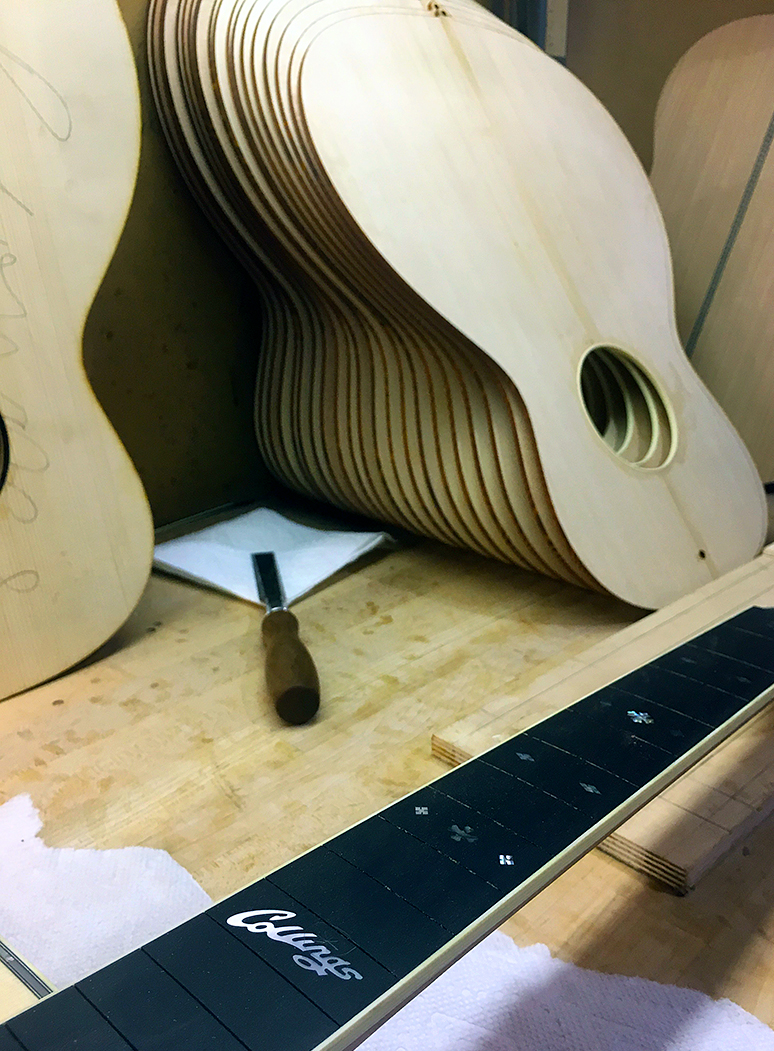
Collings: “If everything was really running well, we’d be doing really well. But since we have hiccups, from not enough (staff). What happened in the down-turn, we wouldn’t fill that back up with people. We would wait until it’s too late. And so the training time would lag. And so you have this big lag of space (for training new staff) that you have to do. So we’re the balance.
"It used to be, the dealers were the balance. And we’d keep shoving (the guitars) down their throat. But there’s only so much (inventory) you want them to have before they start discounting like crazy. So that’s the big problem in the industry: there’s no buffer for us. So we have to try to keep up just in time with the market. And it’s hard to balance all that out with cash. So we get caught. Right now we have 2 ½ million more dollars in orders for this year, than last year."
TMO: That’s great!
Collings: "It’s unbelievable. Some people look at that as a real burden. I look at it as a golden goose’s egg! Let’s go to town!"
New employees at Collings Guitars may not be experienced luthiers explained Mr. Collings: "They're gonna be people with a little gleam in their eye. An interest. Something they can get excited about…and we can take ‘em from there.”
TMO: It seems like your scaling up of employees has been an organic process of growth over the years.
Collings: “It has been very hard (growing and hiring employees). Through the years, people have been here a long time. We just lost one of our really good guys because he wanted to follow his dreams.
"If you don't have a dream, I’d probably fire you. I’m glad for him. He wants to do organic farming, and live off of it.
"I said, ‘Dude…any help you need. If you wanna come back and work, whatever. He’d been here 18 years. Wonderful employee!
TMO: 18 years?!? Wow.
Collings: "I said, ‘Good. Tell me how that organic farming works.’"
TMO: I met the gentleman in the factory that has been with you since very early on. The gentleman that picks the wood out to be used for each guitar.
Collings: "Bruce Van Wart. He’s been with me almost 30 years! And we love to argue, but very rarely. We try, but it doesn’t really go anywhere. He can’t get it out of me. I can’t get it out of him…so." (laughing)
TMO: And you mentioned with training employees…that you’re trying to bring new people in, but…
Collings: "You have to balance that payroll to your output. So as we train new people, that payroll goes up, and it’s not balanced anymore. Their output is not what it should be. You have to get it there, and we’re getting more right now. Because they’re all not gonna make it. Half of (the new hires) might make it. That would be excellent if we picked (new hires) that well. That would be unbelievable. The 100 employees we have has taken forever to get there (up to speed). You can’t just bring them in and go to work. It’s like the 1930s (and an assembly line). They all know at least their job. I wish they were all more well rounded and knew the beginning parts of getting wood out of a tree, and being able to be that guy that can do everything. But it’s just not there. So I can’t give them that (all encompassing education).
"I would love to. And we were going to make a little school, and try to do it. And just do it in Austin...just starting there. And it’s a 10 week course on what it takes to make a guitar with tools. Not with my jigs. Not with my tools. But with real tools that we make…that we make, and understand. Wouldn’t that be cool?"
TMO: That would be super cool!
Collings: That would be really cool. So maybe we’d get more to the root of this woodworking thing. It’s very rare. But as you know: workers, and artists...they're always penalized. Right? It doesn’t matter. We are the short stick of the deal. Nobody with money gives a (expletive) about us. So, you gotta know that. And they have to know it coming in here."
So you’re looking for experienced luthiers that…?
Collings: No. They’re not going to be luthiers.
TMO: No? Interesting…
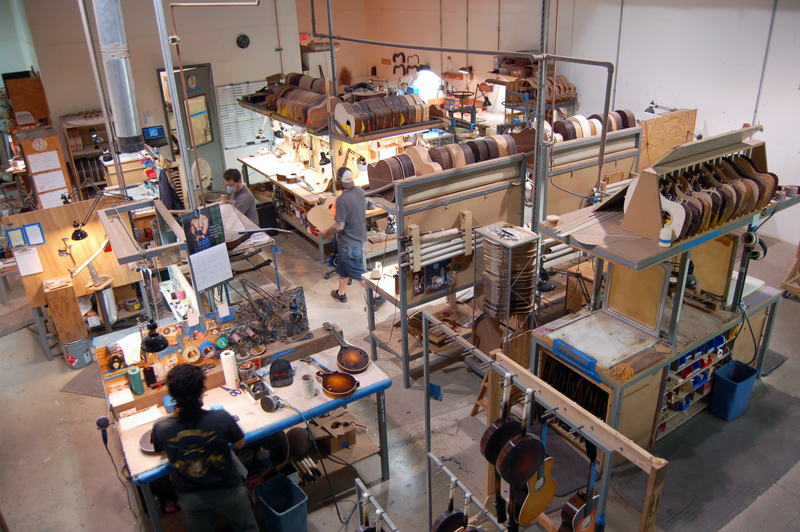
Collings: “They’re gonna be people with a little gleam in their eye. An interest. Something they can get excited about…and we can take ‘em from there.”
"And they’re going to have good hand/eye coordination. That’s the killer. You can have all the drive in the world, but if you can’t push that button at the right time and space, you’re not gonna get it."
“It’s really hard…because you come in with no experience, and you have a whole new world thrown at you. You know, I barely had shop class. My father, in the 1930s…he talked about that shop class until the day he died. They were so good. They taught people the beginnings of folding metal, making these things, doing this, blah, blah, blah. And it was like…that was the course!"
TMO: That’s fasincating that it’s more about someone with a curiosity, and a gleam in their eye. To people outside of Collings Guitars, the expectation might be, ‘Oh. I’ve been a luthier for 5 years. Maybe my resume is good enough to go get a job at…’
Collings: “'Well…start over. How come I haven’t heard of you? What are you doing over there?'
"It’s a tough deal. And then to tell someone that is never any fun, so we never do. You don’t ever want to pop a guy’s cork. But it’s hard to see those instruments sometimes (made by beginning luthiers). Hard.
TMO: You mentioned earlier one of the first guitars you made, you were going for something with a similar tone to a Martin guitar.
Collings: "You’re so nervous going into the design phase, that you don’t know anything that really works anyhow: scale length, how thick it should be, size, why it should be this thick, why it’s that thick, why the braces are shaped a certain way. You just gotta make it.
"I thought I had it all figured out: that’s the best part of this one, that’s the best part of that one…and I put it all together and (he makes a raspberry sound with his mouth). It won’t work. And I had to come up with (the realization) that if you ain’t got it here (he points at his heart), you ain’t got it here (he points at his head). You gotta have that intuition and gut instinct to follow."
TMO: Is there something significant with the aging of the wood in relation to sound?
Collings: "Absolutely."
TMO: And is this partially why the older violins are so highly valued?
Collings: "Well, you would think that. And a lot of it is true. It’s different. There’s no question. Is it better? Yes and no.
"I mean, an old guitar versus a new guitar? We could have a (Martin) 37, which we did in the room the other day. And we could talk about/compare it to a new guitar from my shop. But a seasoned pro might want more evenness between the notes. Or something else…like a high note didn’t pop out. That’s what we (Collings and Punch Brothers' guitarist Chris Eldridge) were talking about. And how I will take that, and shove it down the register, and put it here in the middle more, and add less highs and sizzle, and stuff like that.
"So you start getting into stuff like that, and that’s not something (you can learn) in a book. That’s out there - gut instinct - and it’s great to play with it. But it took me studying those guitars so long to be able to make a new one sound like that old one. Or closer to it than we’ve ever come, without those highs, which I hate.
"I didn’t start getting it until I lost my hearing, and really started paying attention to decibels and stuff. See, I always like a loud guitar. And (Eldridge) said it’s not important. No, it’s probably not important, but everybody out there likes a loud guitar. They want it jumping right out.
"But a pro like Eldridge might want it a little more inward (sounding), and his 37 is. I have a friend with a Martin 36 that he needs to bring by, and it’s a little different. And the differences are amazing between those two years."
TMO: I’m not talking from any kind of science basis, but you’d think that…
Collings: "Well neither am I. There is no science (in this discussion)."
TMO: But is there something that happens with the older wood producing a certain resonance?
Collings: "Yes. Yes. Yes. It’s easier to move (and push sound). It will stay more stable. Everything about it."
TMO: Easier to move the notes?
Collings: "Yes. You just give it a little bit, and a lot will shake.
"So I have a Martin 38 downstairs, and we could play that, and we could play a newer guitar…and you play the newer guitar and the notes and sound is coming out of everywhere. Very fat (sounding). So...yes.
"And you’re going to have a fatter note. You’re gonna hit that B note, and they’ll be no highs in it. It will be round, like this. It won’t be pointed, and that B never does that on a guitar. But when you get a B note to happen, that guitar is happening! Almost always!"
Make sure to check out part 2 of this interview in our July 2017 newsletter, next month!
New, Responsive Website
With a complete top to bottom redesign, TMO has made it even easier to navigate, and find information about Texas music.
Outreach Around the State
May 2017 found Texas Music Office staff criss-crossing the state, and continuing relationships with long-standing partners.

